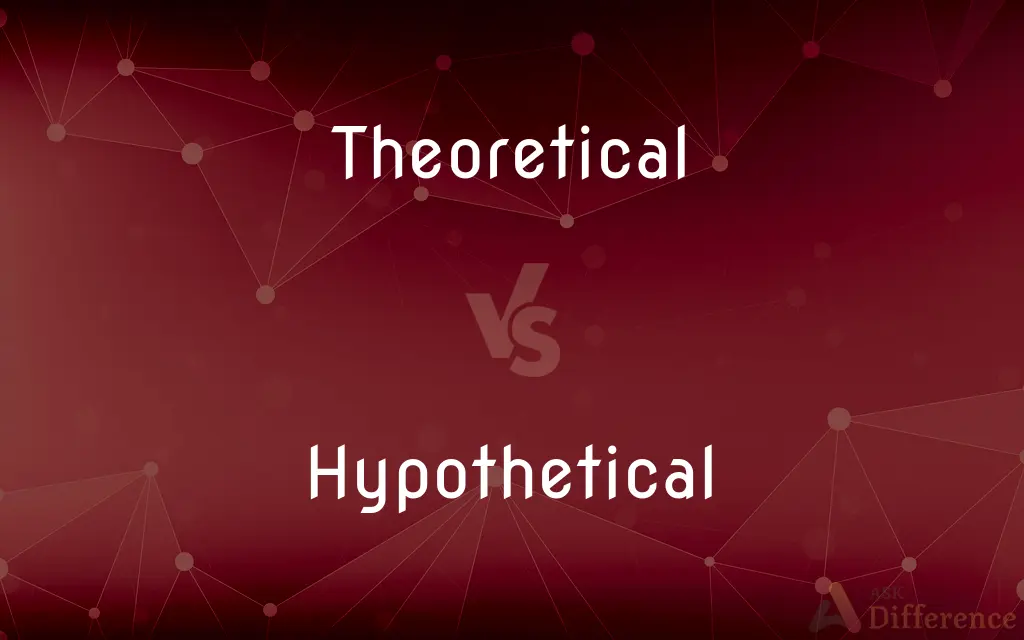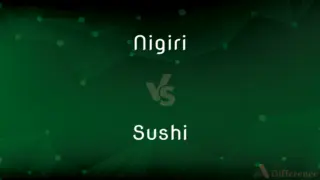Theoretical vs. Hypothetical — What's the Difference?
By Tayyaba Rehman — Updated on October 9, 2023
Theoretical refers to concepts based on theory and not necessarily proven. Hypothetical pertains to a premise or scenario that is assumed but not necessarily real. Both deal with abstraction, but their usage and implications differ.

Difference Between Theoretical and Hypothetical
Table of Contents
ADVERTISEMENT
Key Differences
The terms theoretical and hypothetical both navigate the realm of ideas and abstraction, yet they have distinct nuances. Theoretical typically describes something rooted in theory, implying a systematic set of concepts or ideas explaining a phenomenon. Conversely, hypothetical generally suggests a supposition or imagined scenario without concrete evidence or certainty.
In scientific contexts, theoretical approaches help construct explanations based on existing theories. It relies on established principles to predict or explain outcomes. For instance, theoretical physics employs theories like quantum mechanics to explain the universe's nature. On the other hand, hypothetical often comes into play when posing "what if" scenarios, enabling researchers to examine potential outcomes or reactions based on certain assumed conditions.
When understanding their application in everyday language, theoretical knowledge might refer to understanding gained from books or study without practical experience. For instance, someone might have theoretical knowledge about driving a car but no actual driving experience. In contrast, a hypothetical situation or question starts with a premise assumed for the sake of argument, like discussing what one would do in a hypothetical zombie apocalypse.
While both theoretical and hypothetical navigate intangible realms, their divergence is clear. Theoretical constructs stand on the foundation of existing theories or systemic beliefs, aiming for broader understanding. Hypothetical, however, plunges into the domain of imagination or speculation, often serving as a tool for exploration or debate without asserting factual basis.
Comparison Chart
Basis
Rooted in existing theories
Based on assumption or imagination
ADVERTISEMENT
Use in Science
Provides explanations using established theories
Poses "what if" scenarios for exploration
Application
Predicts or explains outcomes based on theories
Discusses potential outcomes based on assumed conditions
Everyday Context
Knowledge from study, not practical experience
Imagined scenario or condition
Certainty
Implies systematic understanding, though not always proven
Implies lack of concrete evidence or reality
Compare with Definitions
Theoretical
Theoretical implies abstractness, rather than concrete or factual.
The concept is still in the theoretical stage and needs testing.
Hypothetical
Hypothetical involves conjecture without firm evidence.
Her hypothesis remains hypothetical until proven.
Theoretical
Theoretical suggests knowledge not based on practice.
His skills are purely theoretical, lacking practical experience.
Hypothetical
Hypothetical can refer to a conditional statement in logic.
If it rains, the match will be canceled, is a hypothetical proposition.
Theoretical
Theoretical pertains to a subject's theory or system.
Her theoretical understanding of economics is profound.
Hypothetical
Hypothetical implies uncertainty or lack of commitment.
The project is still in the hypothetical stages.
Theoretical
Theoretical refers to the principles or methods of a subject.
The theoretical framework of the study was well-constructed.
Hypothetical
Hypothetical is based on possible ideas or situations rather than actual ones.
He presented a hypothetical scenario where water is scarce.
Theoretical
Theoretical concerns speculation based on probable outcomes.
Theoretical models suggest the planet might support life.
Hypothetical
Based on or serving as a hypothesis
Let us take a hypothetical case
Theoretical
Concerned with or involving the theory of a subject or area of study rather than its practical application
The training is practical rather than theoretical
A theoretical physicist
Hypothetical
A hypothetical proposition or statement
Officials refuse to discuss military policy except in coy hypotheticals
Theoretical
Of, relating to, or based on theory.
Hypothetical
Of, relating to, or based on a hypothesis
A hypothetical situation.
Theoretical
Restricted to theory; not practical or applied
Theoretical physics.
Hypothetical
Conditional; contingent
The hypothetical meaning of a clause beginning with if.
Theoretical
Studying or working to develop theory.
Hypothetical
A hypothetical circumstance, condition, scenario, or situation
OK, let's consider this possibility then—just as a hypothetical.
Theoretical
Of or relating to theory; abstract; not empirical.
Hypothetical
Based upon a hypothesis; conjectural
Theoretical
Concerned primarily with theories or hypotheses rather than practical considerations;
Theoretical science
Hypothetical
(philosophy) conditional; contingent upon some hypothesis/antecedent
Theoretical
Concerned with theories rather than their practical applications;
Theoretical physics
Hypothetical
A possible or hypothetical situation or proposition
These hypotheticals serve no purpose until we have more information.
Theoretical
Based on specialized theory;
A theoretical analysis
Hypothetical
Based on hypothesis;
A hypothetical situation
The site of a hypothetical colony
Hypothetical
Hypothetical denotes an assumption made for the sake of argument.
For this discussion, let's consider a hypothetical situation.
Common Curiosities
Are hypothetical scenarios real?
Hypothetical scenarios are assumed or imagined situations, so they aren't real but are used for discussion or analysis.
What does theoretical mean?
Theoretical pertains to concepts based on theory and not necessarily proven through practice.
Is a theoretical approach practical?
While a theoretical approach is based on theory, its practicality depends on its application and context.
Why are hypothetical scenarios used?
They help in exploring possible outcomes, making decisions, or fostering discussion without real-world constraints.
What's an example of a theoretical study?
A study exploring the nature of black holes using Einstein's theory of relativity is theoretical.
Is a hypothetical situation always unlikely?
Not necessarily; it's an assumed situation for analysis, which might or might not be likely.
Can something be both theoretical and hypothetical?
Yes, an idea can be both unproven (theoretical) and based on an assumption (hypothetical).
Can a theoretical concept be proven?
Yes, theoretical concepts can be tested and potentially proven through evidence or practical application.
How is hypothetical different from theoretical?
Hypothetical involves an assumption or imagined scenario, while theoretical is based on existing theories.
How is a hypothetical question framed?
Often starting with "what if" or "suppose," posing an imagined scenario.
Which is more speculative: theoretical or hypothetical?
Both involve speculation, but hypothetical often leans more toward imagination without a firm basis.
Do theoretical and hypothetical always exclude real-world application?
No, both can influence or guide real-world decisions, but their primary domain is abstraction or assumption.
Can a theoretical idea become a fact?
Yes, with enough evidence and practical validation, a theoretical idea can become accepted as fact.
Can theoretical knowledge be applied in real life?
Yes, while theoretical knowledge is based on theory, it can guide real-world applications.
Are all hypothetical situations fictional?
Not necessarily; they can be based on potential real-world events, though they remain unproven.
Share Your Discovery

Previous Comparison
Nigiri vs. Sushi
Next Comparison
Beaver vs. WoodchuckAuthor Spotlight
Written by
Tayyaba RehmanTayyaba Rehman is a distinguished writer, currently serving as a primary contributor to askdifference.com. As a researcher in semantics and etymology, Tayyaba's passion for the complexity of languages and their distinctions has found a perfect home on the platform. Tayyaba delves into the intricacies of language, distinguishing between commonly confused words and phrases, thereby providing clarity for readers worldwide.
















































